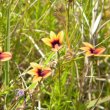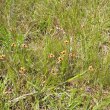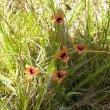| Botanical Name |
|
| Family |
Lobeliaceae - The lobelia family
|
| Pronunciation |
|
| Common Name(s) |
English: Wild violet; Brown lobelia
|
| Plant Group |
- Perennial A plant whose life cycle lasts for three or more seasons.
- Veld Flower Small veld flowers of interest, rather than for their usefulness in the garden. Some of these plants have garden potential, particularly for less formal garden situations.
|
| Plant Size |
- Small
| Tree | 4m to 8m |
| Shrub | 50cm to 75cm |
| Perennial/ground cover | 10cm to 20cm |
| Bulb | 20cm to 30cm |
| Succulent | 10cm to 20cm |
|
| Position |
- Sun The area is in full sun for all or most of the day, all year round.
|
| General Information |
- Deciduous to Semi-deciduous In warmer areas a deciduous plant may not lose its leaves during winter at all, or may lose its leaves for a very brief period, or may only lose part of its foliage.
- Drought Tolerance: Moderate The plant is moderately adapted to arid conditions and can survive short periods of drought and high temperatures without extra water.
- Frost: Tender A plant that will not survive any frost or low winter temperatures.
- Water Moderate These plants will need some extra watering compared to water-wise plants. Plant them together, in at least some shade and in a convenient proximity to the house so that grey water can be utilised during times of drought.
|
| Specific Information |
A small, straggling plant, approximately 15 cm tall with narrow bright green leaves along long stems. Numerous stems grow from the rootstock and in slightly more moist conditions it spreads into large, dense patches. In my dry wild garden it is much less vigorous with only a few stems showing up through the grass.
|
| Ad Break |
|
| Flowers |
| Description |
pale orange with purple markings in the throat turning purple as it withers, 3 pointed petals pointing upwards and 2 pointing downwards, on slender stems
|
| Season |
- Summer Plants will seldom bloom for the entire season as given in the list, but should flower during a period within these parameters.
|
| Colour |
|
| Growth Rate |
- Fast Specifying growth rate can be very misleading as there is considerable variation of growth rate depending on type and species of plant, available water, supplementary feeding, mulching and general care, as well as the plants suitability and adaptability to the garden environment.
|
| Plant Uses |
- Attracts bees, butterflies or other insects This plant attracts insects which can be food for birds or other creatures in your garden.
- Filler Either a fast growing tree or shrub used temporarily to fill in an area while the permanent plants grow to a desired size, or a plant used to fill gaps in borders or beds.
- Rock Garden An area constructed of larger rocks, arranged naturally, to emphasise the use of stones as a main element. Generally plants used do not need a lot of care.
- Wild Garden An indigenous garden planted for the benefit of wildlife and birds. Provides food, water, a variety of mini-biomes and no poisonous chemicals are used.
|
| Distribution and Habitat |
in the Eastern Cape up to KwaZulu-Natal, in open grassland
|
| Planting Suggestions |
The only reference I found of this lobelia being used as a garden plant is from a nursery in the Netherlands, with no specific information given. For the garden I'd use this species to fill a small pocket in a rockery or sunny spot, add a little compost and water when almost dry.
|
| Medicinal Uses |
|
| Ad Break |
|







Discuss this plant
Share knowledge, ask a question or give an experience.